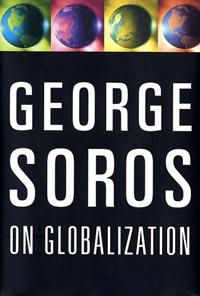By George Soros
 The first and last chapters of this short book are
spectacular overviews of current world economic policy from Soros, a
leading philanthropist and economist. Soros is perhaps the world’s
foremost promoter of open societies, and he delivers a particularly stirring
conclusion to the book – a powerful argument for progressive international
aid and the need to actively help the people of the world.
The first and last chapters of this short book are
spectacular overviews of current world economic policy from Soros, a
leading philanthropist and economist. Soros is perhaps the world’s
foremost promoter of open societies, and he delivers a particularly stirring
conclusion to the book – a powerful argument for progressive international
aid and the need to actively help the people of the world.
It’s not often that any part of an economics book can be called
stirring, but the middle of the book treads in more predictable economic
specifics and dense financial lingo. I found some of it difficult, though
Soros’s main ideas are clear. Soros is well known as a critic of
globalization – but that’s a half-truth. This book clears
his name and sets the record straight. One of my good friends always
gets upset at protesters that “find it easier to fight against
something than offer better suggestions.” Soros is the best example
I’ve read to repudiate that problem. We don’t need less globalization,
he says, just the right kind. He criticizes the WTO (World
Trade Organization), IMF (International Monetary Fund)
and other IFTIs (International Financial and Trade Institutions),
but rather than mindlessly demand their abolishment, he theorizes that
they could do a great job with some changes. He then proposes those changes
succinctly, though in great detail. His strongest suggestion in my mind
is the need for corresponding global social institutions to make up for
the financial institutions’ weak points – labor, the environment,
etc. Like the IMF and WTO, compliance would always be voluntary but based
on tempting incentives of investment.
Unfortunately, Soros doesn’t spend too much time on ways to make
these institutions more democratic. He admits that their policies have
been one-sided towards the center (leading economic powerhouses like
the wealthy investors of the U.S.), but doesn’t detail how this
is tied to their power being in the hands of too few special interests.
Sadly, not all of the world’s wealthiest people are as philanthropic
as Soros, nor do they have the best interests of the global poor always
at the forefront of their financial plans. He does explain how broad
public support is needed, especially in the U.S., if financial aid is
ever going to be seen again as worthwhile as it was during the brilliant Marshall
Plan.
Perhaps because he often qualifies his ideas by calling them suggestions
and opening the stage for further proposals and trial and error, Soros
paradoxically comes across with amazing conviction. I really trusted
his voice as an author. Several parts seemed so clear-cut as solutions
for the world that it shocked me why they weren’t being currently
implemented. Simple programs, targeted like lasers, are capable of driving
even authoritarian countries to commit to human rights and the environment.
An intro to existing IFTIs would have been helpful to read first, but
I highly recommend this book if you want to motivate yourself to find
which specific worldwide economic policies to support, and which to protest.
A short George Soros biography here: http://www.soros.org/gsbio/
Read October 2002